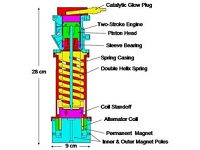Single-Cylinder Two-Stroke Free-Piston Internal Combustion Generator

Technology Description:
Aerodyne Research with partners from Stony Brook University, Precision Combustion, Inc., and C-K Engineering, Inc. will design and build a CHP generator based on a small single-cylinder, two-stroke free-piston internal combustion engine. Similar to an automotive internal combustion engine, the proposed system follows the same process: the combustion of natural gas fuel creates a force that moves a piston, transferring chemical energy to mechanical energy used in conjunction with a linear alternator to create electricity. The free-piston configuration used here, instead of a traditional slider-crank mechanism, has the potential to achieve high electrical conversion efficiency. Their design also includes a double-helix spring that replaces the crankshaft flywheel in conventional engines and can store 5-10 times the work output of the engine cycle and operates at high frequency, which is key to high energy density, compact size, low weight, and low cost. The system will also incorporate low temperature, glow plug-assisted homogeneous charge compression ignition (HCCI) combustion, which reduces heat loss from the engine and further increases efficiency.
Potential Impact:
If successful, Aerodyne’s project will facilitate development and commercialization of economical, efficient, and durable CHP systems for residential use. These advancements support progress toward ARPA-E’s overall goals as follows:
Security:
Innovations developed in this project could help households and businesses become more energy self-reliant and less susceptible to energy-related outages through distributed, local generation of power and heat.
Environment:
Widespread adoption of high-efficiency residential CHP systems could decrease overall primary energy consumption and therefore reduce CO2 emissions associated with electricity generation by up to 10%.
Economy:
Cost-effective natural gas-fueled residential CHP systems could offer consumers lower electricity and heating bills.
Contact
ARPA-E Program Director:
Dr. David Tew
Project Contact:
Dr. Kurt Annen
Press and General Inquiries Email:
ARPA-E-Comms@hq.doe.gov
Project Contact Email:
kannen@aerodyne.com
Partners
Stony Brook University
Related Projects
Release Date:
10/16/2014
